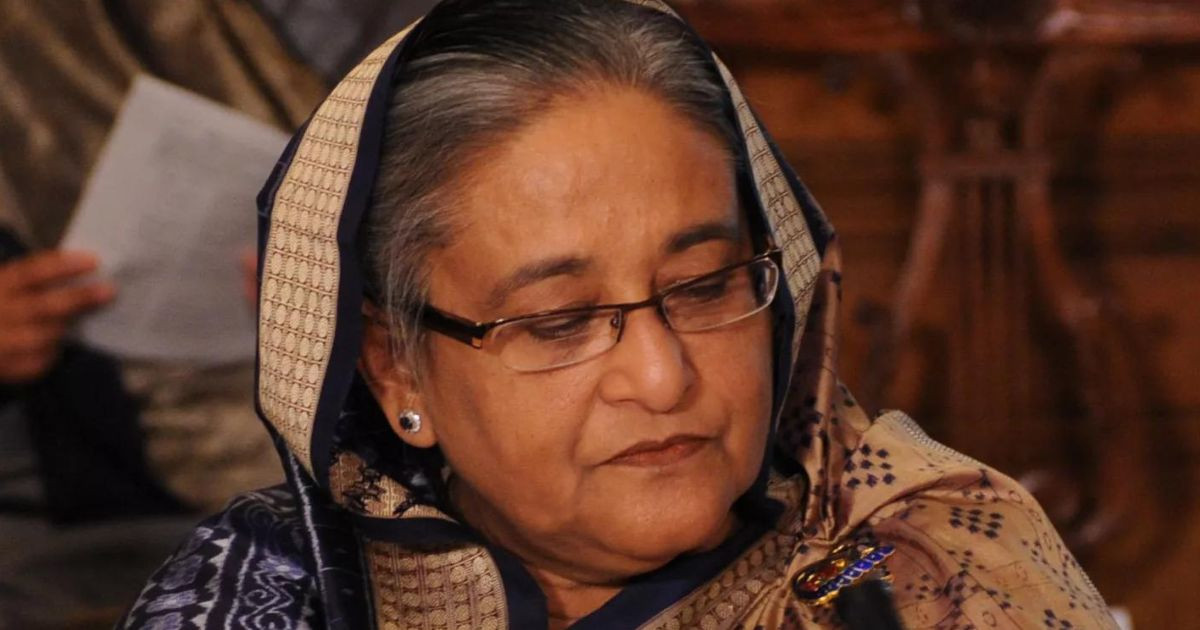Dhaka sends diplomatic note to Delhi on Hasina’s extradition
The 2013 India-Bangladesh Extradition Treaty, amended in 2016, obligates India to extradite individuals charged with crimes punishable by at least one year in prison under both countries’ laws.
Daily Sun Report, Dhaka
Published: 23 Dec 2024

Sheikh Hasina. File Photo: UNB
The Ministry of Foreign Affairs has formally sent a diplomatic note to India’s Ministry of External Affairs, requesting the extradition of ousted prime minister Sheikh Hasina, who fled Bangladesh amid a student-led mass uprising.
“We have issued a note verbale (a form of diplomatic correspondence) to the Indian government, stating that Bangladesh seeks her (Hasina’s) return to face judicial proceedings,” said Foreign Adviser Md Touhid Hossain during a briefing at the ministry on Monday afternoon.
Earlier in the day, Home Adviser Jahangir Alam Chowdhury told the media that a letter had been sent to the Ministry of Foreign Affairs, initiating steps to facilitate Sheikh Hasina’s extradition from India.
“We have forwarded the request to the foreign ministry, and the process is currently underway,” he said.
Meanwhile, India’s Ministry of External Affairs spokesperson Randhir Jaiswal confirmed on Monday evening that India received a note verbale from the Bangladesh High Commission in connection with an extradition request. The MEA, however, did not make any further comment on the matter.
The note verbale was issued following repeated inquiries from the International Crimes Tribunal (ICT) regarding the prosecution’s efforts to bring the former Prime Minister back to Bangladesh.
Sheikh Hasina, president of the Awami League, resigned as prime minister of Bangladesh on 5 August and fled to India in the wake of the mass uprising. She has remained there since.
Subsequently, numerous complaints of “genocide and crimes against humanity” have been filed against her, covering the period between 15 July and 5 August and the 15-and-a-half-year tenure of the Awami League’s authoritarian rule.
The ICT, reconstituted under the leadership of Justice Md Golam Mortuza Majumdar, issued an arrest warrant for Hasina on 17 October in one case and warrants for 45 others, including members of her family and senior Awami League leaders, in another.
On 17 December, the tribunal granted investigators until 18 February to submit a report against Sheikh Hasina.
Since the ICT’s reconstitution, over 300 complaints have been filed in the past three-and-a-half months, involving allegations such as murder, genocide, enforced disappearances, attempted murder, torture, and the Pilkhana tragedy.
Of these, 168 complaints were referred to the tribunal’s investigative body, including 44 specific to enforced disappearances attributed to Sheikh Hasina.
In the aftermath of the interim government’s formation, the Ministry of Health established a committee on 15 August to compile a list of casualties from the July and August unrest.
On 9 September, the ministry reported at least 631 deaths and over 19,200 injuries nationwide during the Anti-Discrimination Student Movement.
A subsequent claim from the central health subcommittee of the anti-discrimination movement on 28 September raised the death toll to 1,581.
On Saturday, the Special Cell for the Mass Uprising released a draft list documenting 858 fatalities and more than 11,000 injuries during the uprising.
Meanwhile, the Commission of Inquiry on Enforced Disappearances has registered 1,676 complaints of individuals missing under the Awami League regime.
The Awami League had originally established the ICT in 2010 to prosecute crimes against humanity during the 1971 Liberation War.
However, the interim government is now employing the tribunal to investigate allegations of genocide perpetrated during the former government’s suppression of the student-led movement.
While some senior Awami League leaders have been arrested, many remain in hiding.
Is Hasina at risk of extradition?
Sheikh Hasina, currently in India, holds no other passport besides her now-revoked Bangladeshi diplomatic passport.
Indian visa rules permit Bangladeshi holders of diplomatic passports visa-free entry for up to 45 days, but Hasina has already stayed for over four months.
With her diplomatic privileges cancelled, she risks extradition to Bangladesh, where she faces over 200 cases, including murder charges.
The 2013 India-Bangladesh Extradition Treaty, amended in 2016, obligates India to extradite individuals charged with crimes punishable by at least one year in prison under both countries’ laws.
Under Article 10(3), an arrest warrant suffices to request extradition, without the need for evidence sharing. While extradition may be refused for political charges, the treaty excludes murder and other serious crimes from this exception.
However, Article 8(1)(a)(iii) allows refusal if the charges are deemed unjust or oppressive, such as being politically motivated.
Hasina’s supporters could argue that the charges stem from political vendetta and that she risks an unfair trial in Bangladesh. In contrast, Bangladeshi authorities might claim accountability for her alleged autocratic rule is essential for justice.
India faces a diplomatic dilemma. It could invoke Article 21(3) to terminate the treaty with six months’ notice, but such a move might strain its strategic relations with Dhaka.
Ultimately, Hasina’s fate depends on New Delhi’s interpretation of the treaty and its geopolitical priorities.

